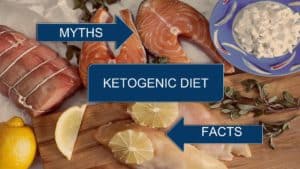If you’re exploring starting the keto diet, you may have also come across the term called “Keto Flu”. People see it as the most common side effect of the keto diet. Staying in a fat-burning state called ketosis comes with a lot of health benefits.
It’s great for long-term and sustainable weight loss. The body takes one to two weeks to adjust to the new mechanism. When you’re first starting out on keto, you may experience a few days of flu-like symptoms as your body learns to switch over from burning sugar to burning fat.
In general language, such symptoms are called keto flu. But these symptoms can not be referred to as influenza. Rather, they’re a byproduct of the body adjusting to a very low-carb diet as it depletes stored glucose.
While doing the ketogenic diet body attains ketosis and fats are used as the source of fuel as the liver starts breaking down fat into acids called ketones. For most people, the adjustment period may be mildly unpleasant but not dangerous to their health at all.
What Is Keto Flu?
The keto flu is a temporary group of flu-like symptoms you might experience in the first week or two of starting a keto diet. Keto flu happens when your metabolism tries to adjust to fats instead of carbohydrates.
When you eat carbs, your body burns them as its main source of energy. But if you drastically reduce your carb intake like on a low-carb ketogenic diet your body depletes your glucose stores and starts burning fatty acids for energy instead.
This metabolic switch is what causes keto flu your body is still looking for carbs because it hasn’t yet figured out how to burn fat for fuel efficiently. Keto flu passes once your body gets out of carbohydrate withdrawal and adapts to burning fat for fuel.
How Does Keto Flu Feel?
The name “keto flu” is quite exaggerated with something negative. People mistook it for an influenza virus.
However, in the initial phase symptoms like headaches, dizziness, fatigue, cramps, and muscle pain might happen. But this is just an indication that the body is entering into ketosis.
If you experience fever and body aches, it’s best to consult with a doctor, as the cause is likely unrelated to a ketogenic diet. The symptoms of keto flu vary from person to person, but there are some common ones to watch for.
Symptoms Of Keto Flu
Generally, the body takes 7 to 10 days to attain ketosis, and symptoms usually begin within the first day or two of carbohydrate restriction.
In general, the symptoms of keto flu are:
- Sugar cravings
- Dizziness
- Brain fog
- Irritability
- Poor focus and concentration
- Stomach pains
- Nausea
- Cramping
- Confusion
- Muscle soreness
- Insomnia
But not to worry, one might experience one or two of these symptoms or none at all. The severity and length of the symptoms will be different depending on the person.
Don’t let the long list scare you! following are the reasons why there isn’t a need to worry about these. You likely will not get all these keto flu symptoms. Everyone reacts differently.
Why Keto Flu Affects Everyone Differently
The main reason behind Keto Flu being different in terms of affecting people is nothing but just metabolic flexibility. Now, this is the capacity for the organism to adapt fuel oxidation to fuel availability.
In other words, metabolic flexibility is how well you can adapt to using different fuel sources like carbs, fats, protein, and ketones. There are many factors that determine metabolic flexibility, but we will stick with two of the most well-known: genetics and lifestyle.
-
Looking At Genetics
From a genetic perspective, certain people are less metabolically flexible because they have genetic variations that make it more difficult for them to adapt to the ketogenic diet.
In contrast, those who are quick keto-adapters may be gifted with genes that enhance their ability to switch between fuel sources more efficiently.
-
Looking At Lifestyle
Lifestyle is a major factor as well. If you are in the practice of eating a diet high in refined sugar and processed foods, you’re more likely to experience severe keto flu symptoms.
On the contrary, If your diet is low on processed sugars and starches, you may only experience mild keto flu symptoms or none at all.
A similar trend emerges with exercise. One should make exercise a part of their life that will be more metabolically flexible than those who are sedentary.
Causes Of Keto Flu
Here are several primary keto flu causes:
-
Electrolyte Imbalance
It is the primary cause of keto flu. Minerals are electrolytes that aid numerous functions when dissolved in water and are necessary for critical body functions.
- Regulating Water In Your Body
- Balancing PH Levels
- Moving Nutrients Into Cells
- Moving Waste Out Of Cells
- Making Sure Your Nerves, Muscles, and Brain Work Properly.
When you restrict carbohydrates, your body produces less insulin, causing your kidneys to flush out excess water and sodium. Our kidneys will also release extra potassium, calcium, and magnesium in order to maintain a balance between sodium and potassium.
You might experience keto flu due to the deficiency of sodium, potassium, calcium, and magnesium in your body.
-
Sugar Withdrawal
Studies show that sugar is highly addictive. If you are into consuming a lot of sugar then switching to a keto diet can come as a shock and lead to withdrawal symptoms.
These symptoms include:
- Cravings
- Anxiety
- Depression
- Irritability
- Insomnia
- Cognitive issues
-
Deficiencies
So, it is great to switch to a ketogenic lifestyle. It is better to consume healthy fats, low-carb vegetables, unprocessed meats, eggs, and other whole foods instead of processed and packaged foods.
However, just like other diets, you can do it incorrectly. If meat, cheese, keto desserts, and low-carb bread are your go-to foods then you may end up with deficiencies in vitamins and other micronutrients.
-
Dehydration
When you derive the maximum percentage of energy from carbohydrates, this leads to increased storage of glycogen in the liver, where they are bound to water molecules and resulting in water retention. Eating low carb depletes this glycogen, which allows you to burn fat but it also means you are storing less water, making it easier to get dehydrated.
However, replenishing electrolytes is as important as drinking an adequate amount of water. Because if you will dilute the concentration of electrolytes in your body even further and possibly make your keto flu worse. This is why it’s important to address both together.
How Long Does The Keto Flu Last?
Usually, the keto flu lasts for about 7 to 10 days. It usually peaks around 3-4 days in. Symptoms usually occur within the first day or two of starting your new diet. How long the keto flu lasts varies from person to person of course.
Some people don’t get the flu at all, while others could experience it for close to a week. However, the symptoms do not last for more than a week and go away once you adapt to them.
Keto Flu isn’t dangerous and it only lasts during your transition into ketosis before disappearing for good. You may experience a few signs like fatigue, trouble focusing, sugar cravings, and headaches.
If it turns up over and over again, you might be going in and out of ketosis. Check your diet for hidden carbs and make sure to track your macros, especially during the first month or so.
How To Get Rid Of Keto Flu
The following steps will lessen keto flu or at least lessen the symptoms.
- Always drink when you feel thirsty, and make sure you drink an adequate amount of water.
- Drink maximum water during the day so your sleep does not get disturbed due to a trip to the bathroom.
- Increasing your sodium intake. This will help counteract the water loss that happens when starting a keto diet and replenish sodium.
- Supplement with magnesium with rich food like avocados, pumpkin seeds, cooked spinach, halibut, cashews, salmon, macadamia nuts, and dark chocolate.
- Eat potassium-rich keto foods. Potassium is an important unnoticed key mineral.
- Eat calcium-rich keto foods like Broccoli, leafy greens, chia seeds, sardines, and salmon are all packed with calcium.
- Taking an electrolyte supplement will help replenish your levels faster as compared to foods.
- Getting light exercise 2-3 times per week can burn through your carb stores faster and increase your metabolic flexibility, which helps relieve the symptoms more quickly.
- Make sure the calories you used to get from carbs are partially replaced by eating plenty of keto-friendly fats.
Keto Flu And Ketoacidosis
Keto flu and ketoacidosis are not the same things.
The disease known as ketoacidosis causes the body to manufacture a lot of ketone substances. The blood becomes more acidic as a result. A condition called ketoacidosis can be fatal. Having said that, Ketoacidosis is uncommon in those following the ketogenic diet.
When To See A Doctor
It may not be necessary to see a doctor if keto flu symptoms appear. Typically, the symptoms are mild, transient, and manageable at home. Doctors can, however, make recommendations for cures that work.
Additionally, they can keep an eye on a person’s health and aid in avoiding long-term issues. These may consist of:
- Severely stated liver (fat accumulation in the liver)
- Hypoproteinemia (low levels of protein in the blood) (low levels of protein in the blood)
- Vitamin and mineral deficits, such as those in vitamin D, selenium, magnesium, zinc, and phosphorus, can cause kidney stones.
Abdominal pain, vomiting, and nausea that last a long time can need medical attention. Anyone unclear of whether their symptoms are normal should speak with a doctor.
To make sure the keto diet is safe, it is a good idea to speak with a doctor before opting to follow it. This diet may not be suitable for everyone and has the potential to lead to serious problems.
People on the ketogenic diet, which can increase cholesterol levels, should have their levels regularly checked by their doctors. People should inform their doctors about this for this reason.
If they fast or follow the keto diet, people with abnormalities in fat metabolism run the danger of going into a coma or passing away.
The diet may also interact with some drugs, such as sodium-glucose cotransporter 2 inhibitors.
In A Nutshell
Keto flu-like symptoms will subside once your body adapts to it. Give your body time. Once the transition phase is over, you can experience increased energy, weight loss, mental clarity, and all the other benefits of ketosis.
Get started with your Weight Loss Journey today and take a step towards a healthy lifestyle! Stay tuned for inspiring Weight Loss Journeys, and Delicious Recipes! Also, don’t forget to follow us on Instagram for the daily dose of Health, and Wellness content!













